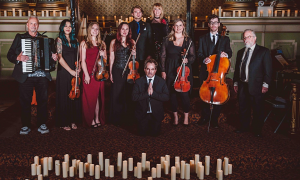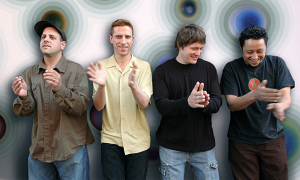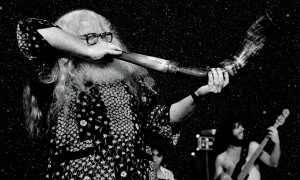Home » Jazz Articles » From the Inside Out » Music from India, Spain, Italy, Tunisia and Other Intern...
Music from India, Spain, Italy, Tunisia and Other International Beats
Turner calls his highly individualized style 'Afrome
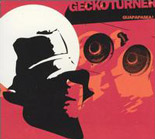 Gecko Turner
Gecko Turner Guapapasea!
Quango
2006
Maybe it's because I grew up around Philadelphia through the 1970s, but I always remember soul music around - soul music light enough to dance like a butterfly on a breeze yet knee-deep enough in the funk that one could dive in and swim. Its charm was easy to recognize and feel, but hard to describe and define.
Gecko Turner's Guapapasea! feels like one of those great breezy soul records. It comes from Spain via his nimble twelve-piece Afrobeatnik Orchestra, which features some of the world's best Afro-Cuban and Brazilian instrumentalists, including percussionist Ruben Dantas (Paco de Lucia, Chick Corea), trumpeter Irapoam Freire, drummer Emilio Valdés (Chucho Valdés), and other instrumental aces from the US, Africa and Spain.
Turner calls his highly individualized style "Afromeño, a mixture of all musics - boy, does he ever mean ALL musics - from Spain, Africa, the Caribbean and the Americas. These cover versions of "Rainbow Country (Bob Marley), and the acoustic lounge-reggae-trip-hop cover of "Subterranean Homesick Blues (Bob Dylan) rendered in Spanish, seem to invite you to wade in these waters.
Because after you grow comfortable enough to dive into "Afromeño, the genuinely inspired lunacy begins. Turner proves quite the tasty instrumentalist on guitars, drums, and programming, and growls and purrs and meows through his lead vocals like a tomcat on a funky midnight prowl. "How Come You Do Me Like You Do Me? (Big Bang Romeo) and "Sabes Quién te Quiere? swing softly on deft rhythms, percussion and guitars, while Latin piano and rhythms rock "Monka Mongas. Lastly, its slinky rhythm and feline melody and vocal make the set-ending "45,000$ (Guapa Pasea) almost impossible to resist.
Guapapasea! will make you smile and dance and shake ya groove thang, yeah yeah. Even if not high art, it certainly delivers high times.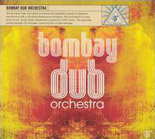 Bombay Dub Orchestra
Bombay Dub Orchestra
Bombay Dub Orchestra
Six Degrees
2006
A dream deferred is not always a dream denied.
In the late 1990s, the UK-based team of composer / arranger / pianist Andrew T. Mackay and producer Garry Hughes (Art of Noise, Sly & Robbie, and the particularly pertinent Pink Floyd Orchestral Project) traveled to India to record Bombay's top session players for a project by Spellbound, a duo from India based in London. "I produced and Andrew arranged, Hughes recalls. "It was a fantastic experience recording these guys, and on the plane coming home we thought how great it would be to make an orchestral chill-out record with these players. In 2005, the duo returned to Bombay to spend their days recording a 28-piece string section (violins, violas and cellos) and their nights recording expert players of classical Indian instruments (bansuri, sarangi, tabla and sitar) and traditional Indian vocalists.
Bombay Dub Orchestra is the "orchestra chill-out record constructed from these recordings. It honors the essential contemplative nature of its source material - Indian classical music - and sparkles with unusual and exquisite beauty. The subtle electronics, pulses and beats, underneath such tunes as "Compassion complement its Indian components, not overpower them.
Solitary violin steps out of the mist overlying "Rare Earth like a solitary eagle's majestic, solitary flight; the soaring North African vocals from Khalid Kharchaf featured in "The Berber of Seville conjures the same mythical, mystical imagery. "To the Shore traverses a melody that is simply, sadly, ethereally beautiful. Though the spotlight mainly (and properly) shines on the Indian instrumentalists, Mackay merits mention as a Harold Budd-like impressionistic pianist on "Sonata and "Remembrance, a two-minute instrumental prayer pregnant with the beauty of becoming that closes the CD.
Okay, that's the "Bombay Orchestra part. The "Dub part comes from the package's second CD, remixes of eight these twelve tracks rendered in dub style, several featuring more exotic names and equally exotic musical visions, such as "The Berber of Seville Orchestral Version: Father Mackay's Celestial Vision, "Rare Earth: The Forest of Thieves Mix and "Dust: The Pigment of Your Imagination Mix.
A dream deferred is not always a dream denied. Gianluca Petrella
Gianluca Petrella
Indigo4
Blue Note
2006
This early favorite among "Best 2006 Debut contenders comes from a young Italian composer and trombone player who says, "I always appreciated the vanguards in our musical world, especially the American one at the end of the '60s and for a lot of the '70s. Important influences include Ornette Coleman, the Sun Ra visionary world, the trombone played in an unconventional way like with Roswell Rudd, the improvised European music, and the more radical and catchy electronics that involve acoustic instruments, too.
Gianluca Petrella here leads a quartet of fellow Italian countrymen Francesco Bearzatti (clarinet, tenor sax), Fabio Accardi (drums) and Dalla Porta (bass) through a colorful spectrum of original, thoroughly modern jazz that begins with a Monk tune, ends with a tribute to Sun Ra, and pairs together two Ellingtons in the middle. Indigo4 is Petrella's first US major label release but not quite his debut, as he has previously performed and recorded with Steve Swallow, Carla Bley, Steve Coleman, Lester Bowie and other well-known vanguard musicians.
The opening cover of Monk's "Trinkle, Tinkle honors jazz tradition in an untraditional way: Petrella first recorded his quartet's acoustic performance of Monk's tune straight-up, followed with spontaneous acoustic improvisation as chaser, then used these recordings in pastiche with additional Monk recordings and other electronic samples to create a "new, old jazz sound that skitters on iced-up drum-n-bass.
On their "I Got It Bad duet, Porta and Petrella create the wobbly sound of acoustic bass and muted trombone growing more and more lovesick together; this couples with a spastic space-age version of "Mood Indigo propelled by Accardi's drum pinwheels. "Lazy Moon uncoils like a long, sloooow daydream, a showcase for Petrella's space-walkin', muted trombone blues. His final adventure reaches backward and forward into jazz' past and future with a sonic tribute to another musician rarely encumbered by conventional time and space, "A Relaxing Place on Venus for Sun Ra.
Blue Note's promotional materials for Indigo4 propose that Petrella is creating "an eccentric yet compelling blend of traditional jazz, electronica and avant-garde. Damn if that ain't the truth! Joseph Israel
Joseph Israel
Gone Are the Days
Lions of Israel
2006
On this debut, young lion Joseph Israel proves a faithful student of classic spiritualized reggae. Judging from his supporting cast, he certainly should: His backing group The Jerusalem Band draws musicians from bands led by contemporary toaster Luciano and Ziggy Marley, Bob's son, and features legendary island guitarist Earl "Chinna Smith plus bassist Chris Meredith, producer for the Melody Makers.
This debut bubbles with reggae thick and bright. Israel sings lead and wrote or co-wrote every song, his music and words resounding with echoes of founding father Marley that are profound and inescapable. Listen to his plaintive lead vocal in the opening "Jerusalem and nearly hear whispers of "Exodus, feel the strength of a young man convicted and strong through his too-tough phrasing in the title track, or burn with his litany of the world's oppressed in "Hotta Fiyah. In this same cut, the female vocalists sway and rumble through a playful chart, testifying with soul like Rita Marley and the I-Threes. All together it creates a classic reggae sound.
A primary contributor to that sound, guitarist Smith works nimble and quick with hot leads in "Truth and rippling fills in the wishful "Jah Kingdom, exquisitely economic, playing no more than is necessary to advance the melody and rhythm, and no less (Smith still sounds, sort of, like the reggae equivalent of rock guitarist Mark Knopfler from Dire Straits).
Israel's lyrics and notes relentlessly explore the relationship between Jah and Yahweh ("Jah -weh) with detailed references to the Hebrew Old Testament and Christian New Testament. From "King of Kings, for example: "Jah so loved the world he gave his only begotten son/ Revelation tells the story about the King of Glory/ The tribulation that is at hand, the destruction of all nations... But he mixes it up tough, too, driving home more aggressive rhythms in the title track and in "Truth, which wraps up in a knotty, rugged instrumental jam.
Gone was co-produced by Israel, Meredith, Smith and drummer Wilburn "Squidley Cole, and recorded at several of Jamaica's most famous studios, including Big Yard (a favorite of Shaggy's) and Bob Marley's preferred studio, Tuff Gong. Not bad for Israel's first time. Various Artists
Various Artists
Ziriguiboom: The Now Sound of Brazil 2
Ziriguiboom / Six Degrees
2005
The music on this compilation is as mysterious, romantic, and fashionable as the continent from which it comes, a roadmap through Ziriguiboom's exotic Brazilian jungle overgrown with cross-pollinated classic and contemporary music; as the packaging says, "from electronic to bossa to samba soul.
Brazil 2 traverses three more or less equal, colorful territories: Traditional acoustic instrument-based vocal ballads presented by Bebel Gilberto, Cibelle, and Celco Fonseca; modern, electronic-based club music by DJ Dolores and the fun-loving Bossacucanova (who sound like Brazil's answer to Canada's reigning musical pranksters, the Barenaked Ladies); plus other contemporary Brazilian sounds that sort of writhe between and around such categories.
Bebel Gilberto strikes the set's most compelling figure with her haunting voice. Remix producer Tom Middleton's new electronic sounds in "Simplesmente truly complement her exquisite vocal, electric keyboards tempering her warm voice with cool chill. The remix of "Cada Beijo by production wizards Thievery Corporation works the same, as new electronics and rhythms luxuriate underneath the cover of her voice. (Jazzheads might recognize Thievery Corporation from their production on the first installment of the Verve Remixed jazz / hip-hop series.) So strongly has Gilberto established her own star presence that one feels almost apologetic for wishing to mention her lineage; she is daughter of bossa nova founding father João Gilberto and stepdaughter to Astrud Gilberto, who breathed that timeless voice into "The Girl From Ipanema.
In the deceptively casual "Por acaso pela tarde, balladeer Celso Fonseca strums his acoustic guitar in a manner so relaxed - so Brazilian - in its ringing rhythm and tones.
From the clubs, Bossacucanova team up with Zuco 103 for "Samba da minha terra, and with samba preservationist / reconstructionist Simoninha for "Essa moca tá diferente, two irresistible rhythms that simply couldn't groove more tight and funky, the "Samba bass line in particular resembling one long flirtatious wink tossed from a beautiful young woman in passing.
Reports from the popular "other precinct include Apollo Nove's ballad "Inexplicata, which opens with African percussion, slides down Hawaiian and Spanish guitars, even whistles the hook to The Good, the Bad and the Ugly, all at a quite leisurely pace; and Zuco 103's "Love is Queen Omega, where dub forefather Lee "Scratch Perry blends into Brazilia the sound of the Caribbean isles and throaty exhortations to "Shake, shake shake!  MC Rai
MC Rai
Raivolution
Embarka
2005
Born in southern Tunisia in 1977, MC Rai proved so adept in the native folk music tradition of Chaabi that he was performing on local radio stations before his eighth birthday. Like most teenagers, his musical horizons expanded as he grew and his ears soon embraced the sounds of Rai music, folk music native to neighboring Algeria, and hip-hop and other modern electronic music.
Now shouting out from San Francisco, MC Rai presents his fusion of Chaabi, Rai and modern music with Raivolution, a melting pot in which ancient and modern instruments - electric bass, guitar and keyboards, modern hip-hop and rap production techniques, accordion, African harp, North African lute, oud, African percussion, Arabian percussion, and Gumbri - simmer into exotic, genuinely cross-cultural music.
At its best, Raivolution locks into its rhythms like a pirate radio station bubbling over in Middle Eastern tongues, exotic Arabian and African sounds slashing through frequencies like scythes. Perhaps anticipating musical or generational culture shock, Rai annotates each song title with its background or purpose.
The opening "Oudies Jam ("An introduction to the album via the sounds of the medina streets ) unleashes hot melodic strings that knot, untie and knot again, like mating serpents intertwining under the relentless dessert sun. Strings and vocal chants flail the rhythm of "Hen' Alina ("Traditional Tunisian political song comparing the love of a mother to love of country ) like an Arabian knight whipping his mount.
(When, you might ask, is Raivolution NOT at its best? When rappers jump in ("Toulli Lila features rapper N4SA, with rapper CB from the collective Alphabet Soup on the title track) and clog up the flow of its rhythms.)
"Ya Siadi, "A Sufi style song asking holy men to give me guidance with my life , illuminates the religious foundation that supports so much of this region's traditional music, a dervish communion of percussion and vocals overlaid with a very modern rock sound. Rai follows this with "Sahran, churning rhythms scalded by emphatically modern electric guitar.
In contrast, "Maktoubi glides softly like a ballerina's slippered feet, its vocal adorned by the chiming sound of its stringed instruments like jewels in the dancer's headpiece. And, quite wonderfully, it's not at all difficult to imagine the accordion and "kick-up-yer-feet tempo of "Bisselama as an Irish jig, a motif extracted from and highlighted even more strongly by the strings in the set-ending "Essaif ("A recollection of childhood summers in Tunisia )!
It's all enough to make one wonder why we're given so many different worlds of music, yet only two ears through which to hear them...
< Previous
Dues in Progress
Next >
Disney Bossa Nova
Comments
Tags
For the Love of Jazz
 All About Jazz has been a pillar of jazz since 1995, championing it as an art form and, more importantly, supporting the musicians who create it. Our enduring commitment has made "AAJ" one of the most culturally important websites of its kind, read by hundreds of thousands of fans, musicians and industry figures every month.
All About Jazz has been a pillar of jazz since 1995, championing it as an art form and, more importantly, supporting the musicians who create it. Our enduring commitment has made "AAJ" one of the most culturally important websites of its kind, read by hundreds of thousands of fans, musicians and industry figures every month.






